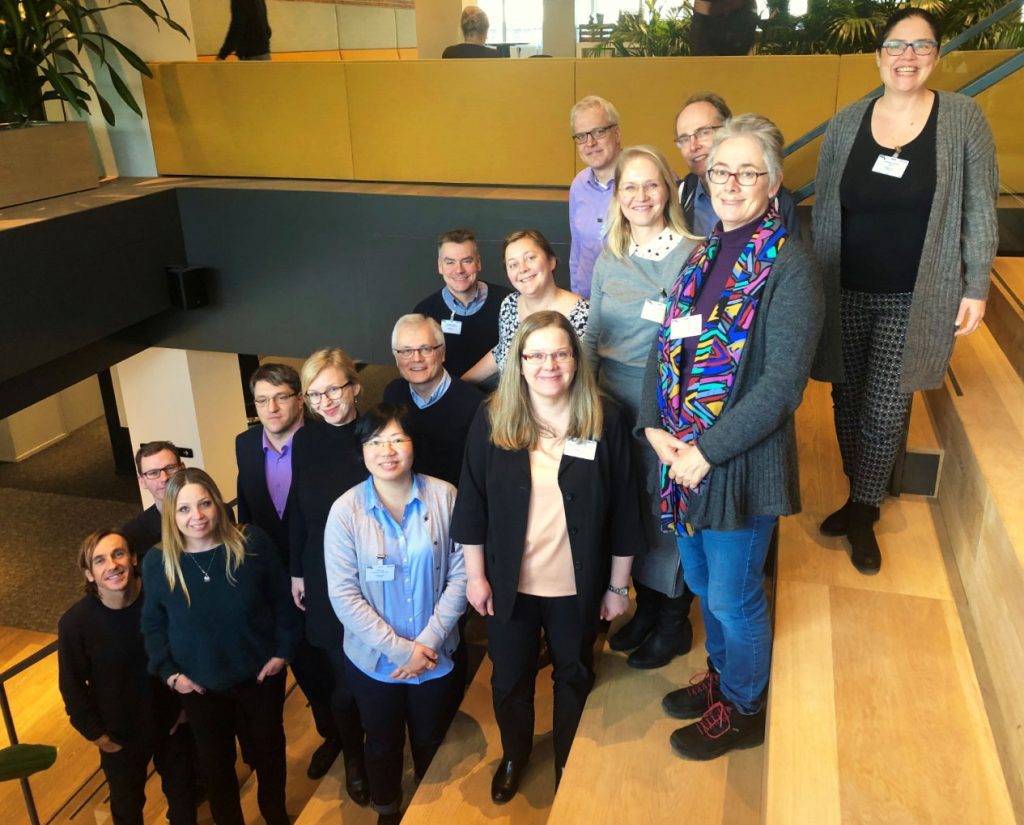Skip to content
Initiators
- Martin Ball
- Emeritus Professor, Linköping University, Sweden
- Clinical phonetics/phonology, sociolinguistics, minority languages
- Nicole Müller
- University College Cork
- Clinical linguistics, bilingualism, dementia, acquired speech and language disorders, minority languages
Partners
- Henk van den Heuvel
- CLST, Radboud University, Nijmegen, Netherlands
- Data curation, speech technology, speech pathology
- Alice Lee
- University College Cork
- Speech sound disorders, speech disorders due to structural deficits, motor speech disorders, typical articulation
- Nicola Bessell
- University College Cork
- Typical and atypical phonetics and phonology, speech variability, acoustic analysis, problem-based learning design, research ethics
- Satu Saalasti
- University of Helsinki
- Multisensory perception of speech in individuals with autism spectrum disorders and neural mechanisms underlying real-life language
- Katarzyna Klessa
- Adam Mickiewicz university in Poznan, Poland
- speech prosody; acoustic and paralinguistic phonetics; design and development of speech and language databases; tools and resources for the speech analysis, including disordered speech (cf. e.g. annotationpro.org)
- Anita Lorenc
- The Institute of Applied Polish Phonetics Studies, University of Warsaw
- clinical phonetics; speech and language therapy; articulatory and acoustic phonetics; speech and language disorders in cases of hearing loss
- (Barbara) May Bernhardt
- University of British Columbia
- Crosslinguistic phonological development, assessment, intervention; ultrasound in intervention
- Tim Bressmann
- University of Toronto, Canada
- Cleft palate, craniofacial syndromes, head and neck cancer, speech sound disorders
- Vesna Mildner & Marko Liker
- University of Zagreb, Croatia
- Coarticulation, instrumental physiological analysis of speech, sociophonetics
- Kakia Petinou
- Cyprus University of Technology, Dept of Rehabilitation Sciences
- Developmental language disorders, child apraxia of speech, speech sound disorders, autism spectrum disorders
- Gordana Hržica
- University of Zagreb, Faculty of Education and Rehabilation Sciences
- First language acquisition, bilingualism, Aphasia, developmental language disorders
- Antoin Eoin Rodgers
- University of Limerick / Trinity College Dublin
- Phonetics and phonology, pronunciation training
- Eleanor Lawson
- University of Strathclyde
- Online vocal-tract imaging training tools
- Elena Babatsouli
- University of Louisiana at Lafayette
- Phonological development (child, adult, linguistic diversity), clinical phonetics
- Traci Walker
- University of Sheffield
- Clinical and typical phonetics/phonology, conversation analysis of developmental and atypical interactions
- Joaquim Llisterri
- Universitat Autònoma de Barcelona
- Clinical phonetics, spoken language resources, Catalan and Spanish phonetics
- Hanne Gram Simonsen
- University of Oslo, Norway
- Clinical and typical linguistics and phonetics/phonology, acquisition, multilingualism, aphasia, dementia
- Mile Vuković
- Faculty of Special Education and Rehabilitation
- Aphasia and related speech and language disorders
- Khiet Truong
- Human Media Interaction, University of Twente
- Emotion recognition, Alzheimer patients
- Alain Ghio
- Aix-Marseille University, LPL, CNRS, France
- Voice and speech assessment
- Marina Ruiter
- CLS, Radboud University, Nijmegen
- Acquired language disorders (e.g., aphasia and cognitive communication disorders)
- Martin Matthiesen
- CSC – IT Center for Science, Finland
- Sensitive Data, Encryption, Systems Administration
- George Christodoulides
- University of Mons, Belgium
- Speech prosody; speech under cognitive load; computational paralinguistics; speech technology and machine learning
- Stuart Cunningham
- University of Sheffield
- Clinical uses of speech technology, particularly for people with dysarthria
- Elizabeth Roepke
- Doisy College of Health Sciences, Saint Louis University
- Speech, Language, and Hearing Sciences
- Chiara Barattieri di San Pietro
- University of Firenze
- Cognitive and computational linguistics. Semantic and syntactic anomalies in psychiatric and neurological conditions
- Elmar Nöth
- Friedrich-Alexander-Universität, Pattern Recognition Lab
- Progression of neurological diseases & speech pathologies
- Iris Edda Nowenstein
- University of Iceland & University Hospital of Iceland
- Clinical language technology, language and memory, diagnosis and monitoring of neurodegenerative diseases
Interested partners
- Bert de Swart
- Radboud UMC & HAN, Nijmegen
- Rehabilitation, speech & swallowing disorders
- Martina Ozbič
- Faculty of education, University of Ljubljana, Slovenia
- Language therapy and special and rehabilitative pedagogy
Scroll back to top

